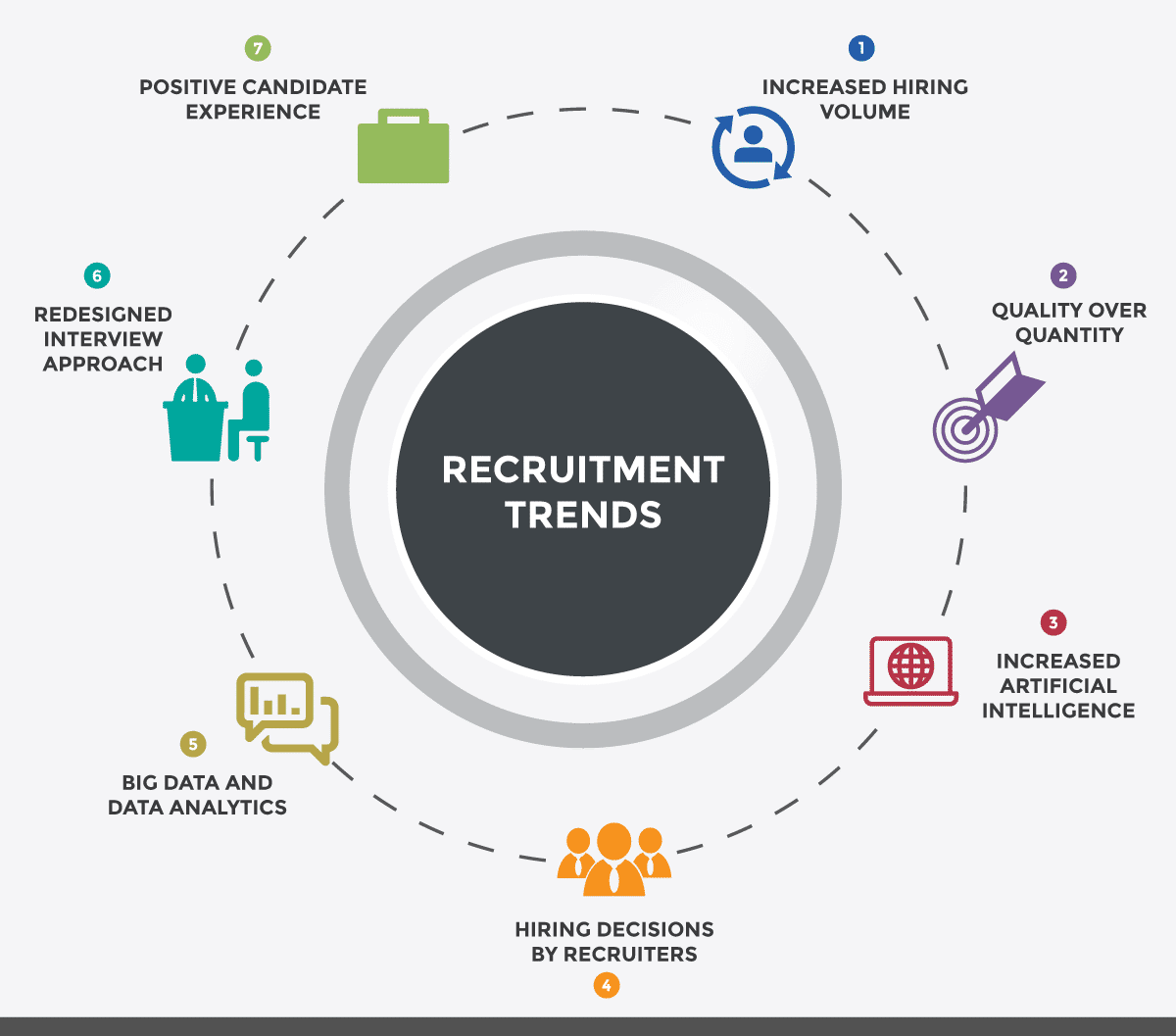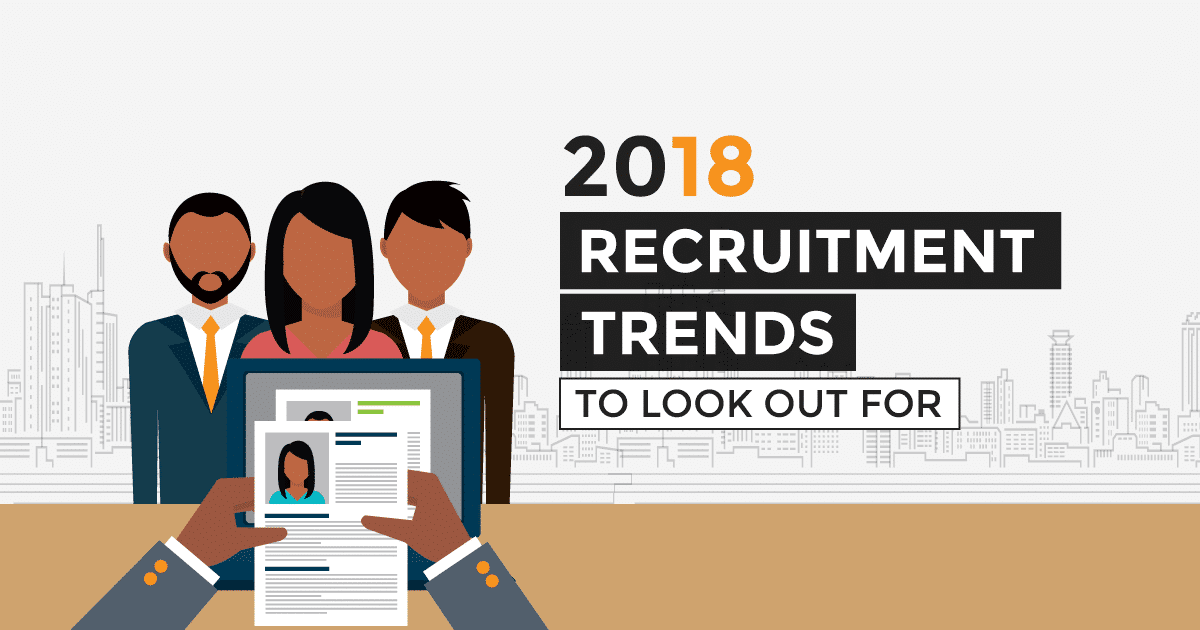The hiring process hasn’t been easy over the years, and it doesn’t seem to ease in the new year. Technological milestones have seen the advent of new jobs; specialisation has resulted in shrinking talent pools; and now more than ever, companies are in high competition for talent in the market.
The only way to thrive in the highly competitive scramble for talent is to understand the trends that are now shaping how companies in various industries are recruiting and working to get ahead of them.
Here are 7 recruitment trends we believe are transforming the way you will hire in 2018 and the coming years.

Table of Contents
Increased Hiring Volume
Over the past year, hiring has been on a steady increase. A recent study by Indeed shows that there will be a hiring boom in 2018 with 61% of their respondents expecting to hire within the year. While the study was conducted in the USA, there is a possibility that the wave could ripple across the global markets, including Africa. Strides in technology and blooming economies are major factors behind the move to hire new employees to support business growth. This could also be due to the fact that 2017 was an election year for many countries, and with the elections over it is now time to focus on economy building.
2. Quality Over Quantity
A BrighterMonday Kenya’s survey found that there’s an average of 200 applications responding to a single job advert. Most of these applicants are not qualified for the position or do not possess the required work experience. Thus employers have to go through so many CVs before they can identify one profile that is close to their desired candidate. In 2018 and beyond, however, recruiters and HR professionals will be keen on efficient recruitment that filters quality applications saving time and resources. This means that recruiters will adopt software tools that automatically match candidates and available roles.
There is a definite shift in what talent acquisition professionals consider valuable in their quest to discover, attract and retain good talent. They are now impressed by the quality of applications rather than the number of applicants interested in a particular position. Which leads us to the third trend on this list;
3. Increased Artificial Intelligence
AI is a definite game changer in many industries, including HR. LinkedIn states that AI is most helpful for recruiters sourcing candidates as it removes bias, helps save time and delivers the best candidate match. With AI tools, the software learns a role’s requirements, scans the candidate database to find right matches and then automatically assigns grades to identify strongest candidates to interview.
Chatbots can also be used to identify interested candidates for a certain role. The bot can answer candidates’ questions regarding your company and the role in question. If a certain candidate loses interest in the information provided by the bot, the bot is able to sense it and removes that candidate’s name from the pool. This allows you to spend your resources on more interested candidates.
4. Hiring Decisions By Recruiters
One important thing to note is that, even with the use of technology and AI, hiring managers still make the hiring decisions at the end of the process. This means that the recruiting process is not entirely automated, and with good reason. After suitable candidates are identified by AI softwares, hiring managers need to meet the candidates to ascertain they have the required communication, interpersonal and soft skills required, as well as identify whether or not they are a good fit for the culture.
5. Big Data and Data Analytics

Human resource specialists are waking up to the power of big data and how they can leverage its use in hr functions. Big data can help you transform your hiring and retention campaigns. With good analytics, you can begin identifying trends in the market and use this information to predict what is next, hence getting the edge you need to acquire good talent. Well managed data on candidates also helps you create candidate pools from which you can easily get your next hire for a future position.
6. Redesigned Interview Approach
With the changes being experienced in the job market, there is going to be a shift in how interviews are conducted. Recruiters are already applying unconventional methods in interviews like video conferencing to hold interviews. There is also a growing need for candidates to demonstrate their skills in real life situational tests. This helps identify the best performer in a group of suitable candidates.
7. Positive Candidate Experience
Still on recruitment, there is a growing trend in companies to offer candidates a positive experience, away from the slow, unfriendly and outdated recruitment practices that have given recruiting a bad name.
Companies are now paying more attention to how they treat candidates during interviews. The qualified candidate obviously has more than one options on their next employer. Giving them a good experience is providing them with a glimpse into your amazing office culture and tilting the odds more in your favour as a recruiter.
There is a growing mindset of the candidate being a consumer in 2018. This means that a good interview experience is tantamount to good employer branding. When candidates have a good experience with your hiring manager. If they consider the process efficient and smooth, they associate that experience with what it might be like on a day to day work life in the company. This makes them more inclined to accept your offer when you make it.





